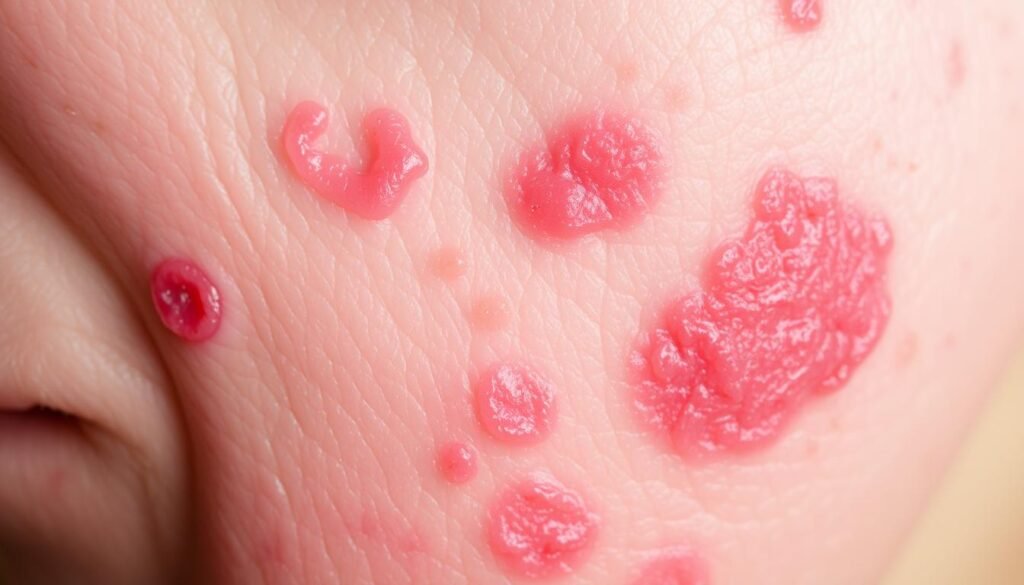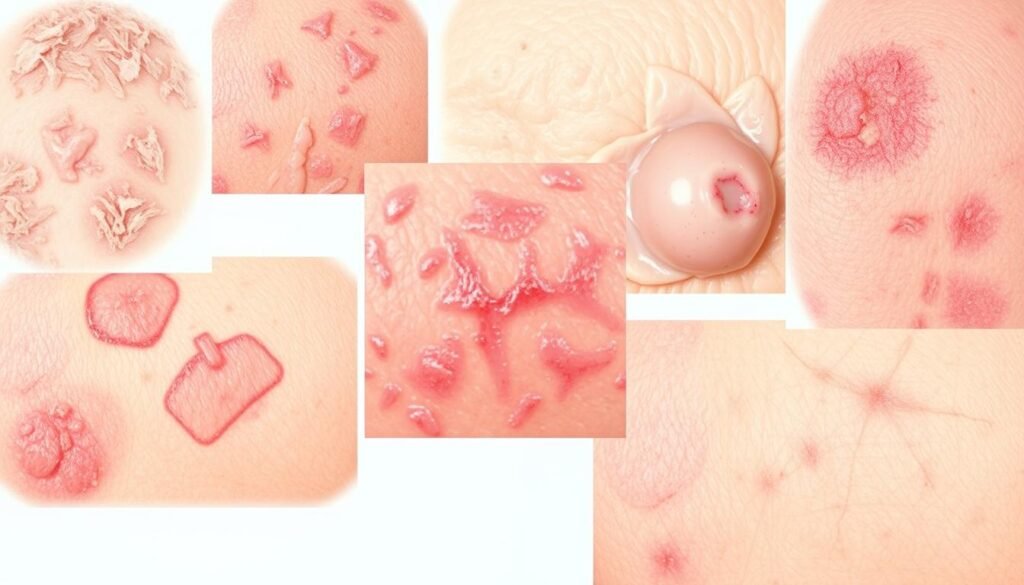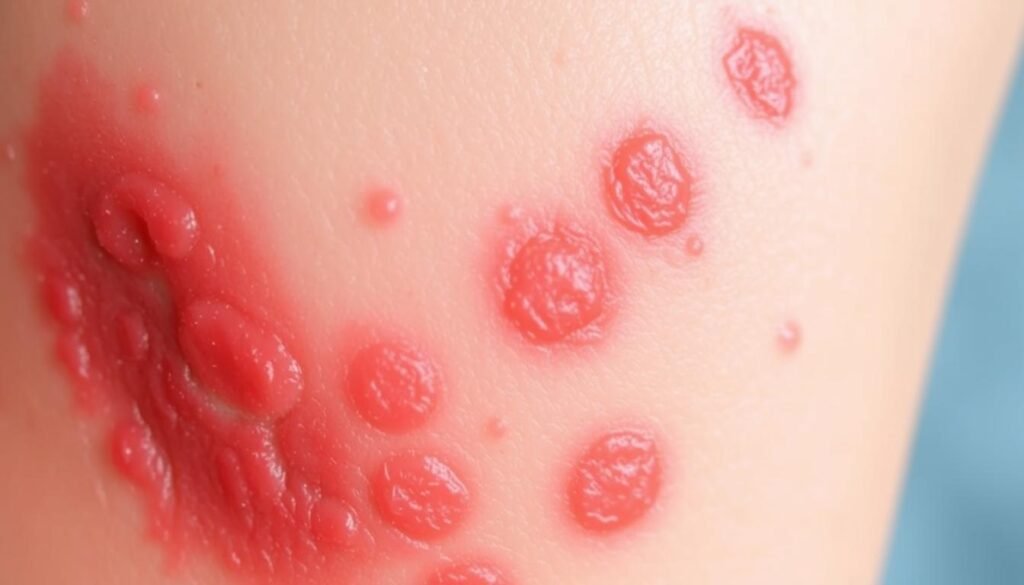More than 31 million Americans struggle with eczema, a chronic skin disorder. This condition, known as atopic dermatitis, is most common. It affects over 9.6 million children and 16.5 million adults in the U.S. alone. Eczema usually starts in childhood but can also begin in adulthood. It causes itchy skin issues ranging from mild irritation to severe cases needing hospital care.
It’s important to understand eczema to manage it well. Those with eczema often feel uncomfortable and self-aware. The condition is linked to other skin problems, food allergies, and mental health issues. Recognizing symptoms and finding the right treatments can help people improve their skin health. For tips on managing eczema, visit effective eczema management.
Key Takeaways
- Atopic dermatitis affects millions, highlighting the need for awareness and effective management.
- Common symptoms include dry skin and intense itching that can disrupt daily life.
- Understanding triggers is essential for preventing eczema flare-ups.
- A comprehensive skincare routine can significantly improve skin condition.
- Effective treatment options, ranging from topical ointments to lifestyle adjustments, exist.
- The mental health aspect of eczema should not be overlooked, as it impacts many sufferers.
What is Eczema?
Eczema, often called dermatitis, involves various skin problems that make the skin dry, itchy, and inflamed. Atopic dermatitis is the most common type, and it mainly affects people with allergies like asthma and hay fever. Between 15% and 30% of kids and 2% to 10% of adults may get eczema in their life. It usually starts in babies, with about 60% of cases happening in the first year.
Eczema skin isn’t contagious, but it can make people feel anxious because of how it looks. Both your genes and your surroundings matter in getting eczema. Some folks have a problem with their skin barrier, which means they lose more water and get irritated easier. The filaggrin gene (FLG) is one genetic factor that affects this.
Certain things like soaps, dust mites, and stress can make eczema worse. Hormones and the weather can also play a part. Eczema can show up on the elbows, knees, and hands. Babies often have it on their face. Knowing the signs of eczema early is important. Visit this link to learn more: Understanding these symptoms early.
To take care of eczema, using moisturizers and sometimes steroid creams helps. There’s no cure, but managing it well can make life better. Taking special care of your skin is key for those with this dry, itchy skin issue.
Common Symptoms of Eczema Skin
Eczema affects people’s lives with different symptoms. Knowing them helps manage the condition sooner. The key signs include:
Itchy Skin
Itchy skin is a big sign of eczema. It can cause a lot of scratching. This may make the skin worse and raise the chance of getting infections. Often, the itchiness gets worse at night. This makes sleeping hard. Knowing about this helps take steps to lessen the itchiness.
Dryness and Redness
The skin may also be dry and red where eczema appears. How these signs show can change based on skin color. For example, redness is more visible on light skin. But, on dark skin, the areas might look gray, brown, or purple. Seeing these changes early leads to faster treatment. Keeping the skin moist is key for taking care of eczema.

| Symptom | Characteristics | Effect on Life |
|---|---|---|
| Itching | Persistent and often worse at night | Disrupts sleep, leads to skin damage |
| Dryness | Flaky or scaly appearance | Can cause discomfort and sensitivity |
| Redness | Varies by skin tone | May affect self-esteem and social interactions |
Types of Eczema
Eczema is a term for different skin conditions. They each have their own signs and ways to treat them. We often see types like atopic dermatitis, contact dermatitis, and dyshidrotic eczema.
Atopic Dermatitis
Atopic dermatitis is very common, especially in kids. It usually shows up between 2 months and 5 years old. Although it may get better with age, some people still get flare-ups later on.
Children with this condition might also have asthma or hay fever. It shows there’s a link with other allergic conditions.
Contact Dermatitis
Contact dermatitis happens when skin reacts to substances. These can be allergens or irritants. Two kinds exist: allergic and irritant contact dermatitis.
It can make your skin itch, turn red, or even blister. Sometimes this happens 48 hours after touching something. Figuring out what triggers it is key to feel better.
Dyshidrotic Eczema
Dyshidrotic eczema mainly affects adults. It causes tiny blisters on hands and feet. These can last 2 to 3 weeks.
Things like allergies, nickel, and stress might set it off. Knowing what triggers your eczema helps in managing it.

Understanding Eczema Flare-Ups
Eczema flare-ups can make life hard for people. It’s important to know what causes them and how to control symptoms. This knowledge helps people deal with chronic skin problems better.
Common Triggers
Many things can cause eczema to get worse. Among them are:
- Environmental allergens such as pollen and pet dander
- Stress and anxiety, which can make symptoms worse
- Temperature changes and harsh weather
- Household products like soaps and detergents that irritate
- Food allergies or sensitivities
Knowing your specific triggers is key. For some, metals like nickel or chromium cause contact dermatitis.
Managing Flare-Ups
Dealing with eczema flare-ups takes several steps. The first step is to know what triggers them. A good skincare routine should focus on keeping the skin moist. Also, steroid creams can help during a flare-up if used right.
Self-care is also critical. This includes eating right, getting enough rest, and reducing stress. Keeping a diary of symptoms and triggers can help your doctor create a better treatment plan for you. Make sure to visit your dermatologist regularly to keep your treatment up to date. Check out more on managing eczema here.

Eczema Skin Care Routine
Keeping up with a skin care routine is key for eczema. It helps manage the condition and prevent flare-ups. Moisturizing right after bathing is vital to keep the skin hydrated. By following effective moisturizing tips, you can soothe the dryness eczema causes.
Moisturizing Strategies
For best results, apply moisturizers right after you bathe to seal in moisture. Dermatologists say doing this within five minutes of showering works great. Keep your baths or showers short, no more than 5-10 minutes, to avoid drying out your skin. Ointments or creams are better for hydration than lotions because they have more oil. Always choose products that are free from fragrances, dyes, and irritants to avoid eczema flare-ups.
Choosing the Right Products
Picking the right products for eczema is crucial for effective skin care. Brands like CeraVe®, Eucerin®, and Cetaphil Eczema® have formulas that support sensitive skin. These moisturizers have ceramides, which are great for restoring skin’s essential lipids. If you have eczema, these are often missing. Make sure to talk to a dermatologist to find the best products for your skin type.
| Product Type | Recommended Brands | Features |
|---|---|---|
| Moisturizers | CeraVe®, Eucerin®, Cetaphil Eczema® | Fragrance-free, ceramide-rich |
| Ointments | Vaseline® | High oil content, excellent for hydration |
| Natural Treatments | Colloidal oatmeal, Virgin coconut oil | Soothing properties, may reduce irritation |
Using these skin care strategies can really help with eczema. Regular moisturizing and picking the right skin treatments make a big difference. They improve skin health and make flare-ups less common.
Effective Treatment Options for Eczema
Eczema treatments cater to each patient’s unique needs. To soothe symptoms like redness and itchiness, topical treatments are key. They include medicines such as corticosteroids and other inhibitors that reduce inflammation and soothe the skin.
Topical Treatments
There are over-the-counter (OTC) remedies to manage eczema. Common OTC options are:
- Hydrocortisone cream: A mild steroid for temporary relief.
- Antihistamines: Diphenhydramine and loratadine reduce itching.
- Pain relievers: Acetaminophen and ibuprofen ease discomfort.
- Barrier repair moisturizers: They lock in moisture, preventing dryness.
- Specialized shampoos: Like ketoconazole, for scalp seborrheic dermatitis.
These help a lot, especially with mild eczema. For tougher cases, doctors may prescribe stronger treatments.
Systemic Medications
Dermatologists suggest systemic meds when creams aren’t enough. Biologics like dupilumab (Dupixent) are for moderate to severe eczema. They target the immune system to control symptoms.
Also, the FDA has approved new treatments, including Ruxolitinib cream. Treatment time varies, often lasting months to years. Regular doctor visits help tailor treatments, especially during flare-ups. For info on OTC products, visit effective options.
Lifestyle Changes to Manage Eczema
To manage eczema well, you need more than creams. Dealing with stress is key. Putting in place stress-lowering tactics is essential. What you eat also affects your skin, particularly if you have food allergies that trigger eczema.
Stress Management Techniques
Keeping your emotions in check helps control eczema. Here are some ways to ease stress:
- Mindfulness practices: Meditation or yoga can soothe your thoughts.
- Regular exercise: Staying active benefits your mind and skin health.
- Quality sleep: Good sleep can help manage stress and skin symptoms.
- Creative outlets: Arts and crafts can shift focus away from itchiness and stress.
Dietary Considerations
Changing what you eat can aid eczema management. Here are a few tips:
- Identifying triggers: Tracking your meals and symptoms helps pinpoint what to avoid.
- Eating anti-inflammatory foods: Foods like nuts, whole grains, and fish may lessen outbreaks.
- Staying hydrated: Lots of water is crucial for skin moisture.
- Seeking professional guidance: A dietitian can give personalized advice on managing eczema.
Adopting these lifestyle changes can greatly benefit those with chronic skin conditions. Managing stress and making wise food choices can ease eczema symptoms. This improves life quality for many.
Prevention Tips for Eczema Skin
To prevent eczema flare-ups, learn about and avoid known irritants. Also, take good care of your skin barrier. Adopt certain lifestyle changes and skincare practices. These steps will help lower the effects of eczema.
Avoiding Irritants
Knowing what irritates your skin is key to keeping it healthy. There are common things to look out for:
- Wool and polyester fabrics
- Fragranced soaps and laundry detergents
- Aftershave lotions and solvents
- Certain household cleaners
Keep a good skincare routine to stay away from these irritants. Wear gloves when using cleaners or in the cold. This can protect your skin. Try to wear soft fabrics, like Supima cotton, to avoid irritation.
Maintaining a Healthy Skin Barrier
Moisturizing often is crucial for repairing your skin barrier. Use thick, unscented moisturizers twice a day. This will help against dryness and eczema outbreaks. It’s also important to take short, warm showers with fragrance-free products.
Moisturize after drying off to lock in the moisture. Taking care of your mental health helps too. Deep breathing and meditation can lower stress. This reduces the chance of eczema flare-ups. Good mental health means healthy skin.
Conclusion
Knowing about eczema skin is key for handling it well. This is especially true since many people have it. Up to 25% of kids and about 10% of adults deal with atopic eczema. Being aware of the symptoms like itching and dryness is the first step to managing this condition.
A good skincare routine is crucial for fixing the skin’s barrier. It’s important to moisturize regularly and choose gentle products. This helps keep the skin moist and safe from irritants. Changes in lifestyle, like reducing stress and eating better, also play a big role in taking care of eczema.
With the right support and knowledge, people with eczema can manage their symptoms better. They can find comfort and keep their skin healthy. By focusing on managing eczema, they can have healthier skin, fewer flare-ups, and a happier life.